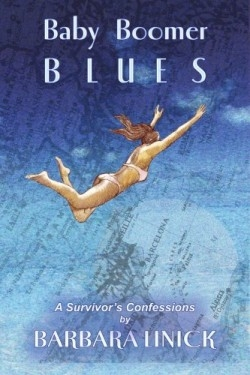Baby Boomer Blues
A Survivor's Confessions
“’Where have you been darling?’
‘Well Ma’ I replied ‘I’ve been in prison in Morocco.’
She looked at me. ‘You must be hungry.’“
Zinnia Frisch an expatriate American and her secretive Dutch husband Beri are preparing a huge transatlantic shipment of hashish from their beach resort in Tangier. They anxiously scan the waves for the running lights of a craft aptly named Wanderlust half-expecting police to jump from the shadows. Such elongated moments of combined dread and anticipation make exciting lives and dramatic self-searching fiction.
The story backs up five years to 1970 to show how far the daughter of a cryptographer has come from her New York roots. Though she protests against the Vietnam War in college and speaks vaguely against consumerism specific ideologies aren’t a lasting priority. Zinnia’s peers seek out rat-race cubbyholes but she would rather find out what European adventures will do for a case of naive malaise. An extended vacation begins by visiting relatives and acquaintances in Austria Switzerland and Genoa. The Mediterranean island of Ibiza fits perfectly enough to become a new home. Some readers may be temporarily restless between the downshift into the backstory and fully realized milieu of the Ibizan expatriates.
On the island Zinnia befriends artsy uninhibited beautiful people and becomes a regular at full moon parties. Everyone in her orbit shares part of themselves socially but holds back information. She is aware that an indecisive nature allows her persona to be reshaped by environment. The motives of those nearby are quite questionable. All-night dance clubs host smugglers who prowl for transit mules. Zinnia earns wisdom enough to uncover the mechanism of the carefree subculture: “There was an implicit mystery an implicit illusion among us…about freedom or obligations. We were colluding in the visionary art of make believe.”
Prince of Tides novelist Pat Conroy notes that “…boomers have redefined every age they’ve moved through…” They pretty much owned the Seventies; their cultural touchstones dominate this book. Linick thoroughly tacks morally ambiguous sexual and criminal lifestyles to an exceptional time and place. Emblematic signposts of the boomer generation are spread thick here from Transcendental Meditation to the Rolling Stones from Fellini films to Pink Floyd’s Dark Side of the Moon. In moments of doubt Zinnia tends to blame external factors. She’s so sympathetically drawn that it feels natural to agree.
Baby Boomer Blues is both earthy and cosmopolitan. It appeals to a generation who put a premium on the quest for identity people who believe in the authenticity of firsthand experience. Recommended to the widest population cohort and anyone else who has been struck in their youth by the urge to see what’s going on over the next hill.
Disclosure: This article is not an endorsement, but a review. The publisher of this book provided free copies of the book and paid a small fee to have their book reviewed by a professional reviewer. Foreword Reviews and Clarion Reviews make no guarantee that the publisher will receive a positive review. Foreword Magazine, Inc. is disclosing this in accordance with the Federal Trade Commission’s 16 CFR, Part 255.

